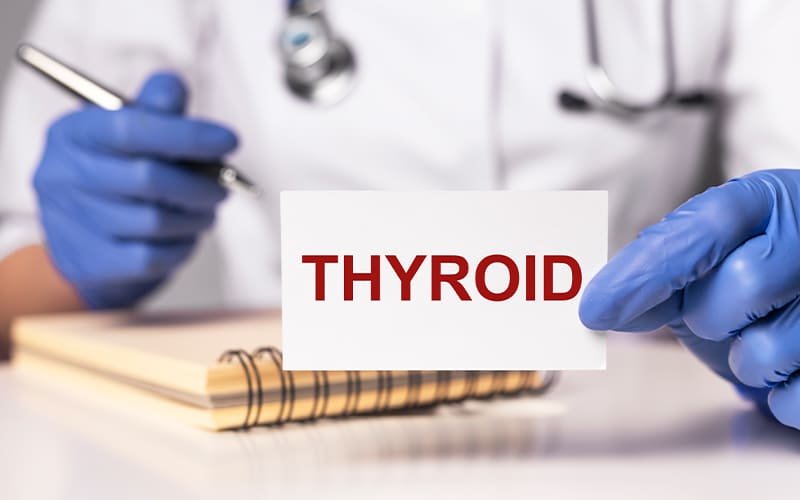Thyroid hormone replacement therapy is required for those patients who suffer from hypothyroidism. When the thyroid gland produces little to no T4 (thyroxine) hormone, then thyroid replacement therapy is usually prescribed. A general physician doctor in Kolkata takes a look at the details.
What is Thyroid Hormone Replacement Therapy?
This is a therapy where synthetic T4 (thyroxine) hormone is prescribed to patients to counter the hypo-functioning of the thyroid gland. It is usually taken in pill form.
Sometimes, the T3 hormone is also taken. This is prescribed after thyroid surgery or because the entire thyroid gland has been removed.
Who Needs Thyroid Hormone Replacement Therapy?
Apart from those with hypothyroidism, this therapy is prescribed for those who have goitre, growth nodules on the thyroid gland, have had their thyroid removed, or for treatment of hyperthyroidism by radioactive iodine ablation.
When and How to Start Thyroid Hormone Replacement Therapy?
At the outset, let this general physician doctor in Kolkata inform you that starting thyroid hormone replacement therapy is not something you should start on your own.
It requires very accurate measurements of TSH and T4 hormones to determine the dosage.
Every individual is different and the dosage will vary from person to person. Also, how the body reacts to therapy, will eventually control the prescription. Here’s how to take the medication:
- You should take the medication at least 1 hour before breakfast and before any calcium/iron tablets you may take.
- If you prefer to take it after dinner, do so, at least 3 hours after eating or taking any calcium/iron tablets.
- If you forget to take your thyroid medicine at the regular time, take it as soon as you can, but do not take a double dosage.
In case you get pregnant or are taking other medication, inform your doctor, as this therapy may affect and be affected by other medications.

What to Expect After Taking the Replacement Therapy?
There are some side effects of taking thyroid replacement therapy. They are as follows:
- Anxiety and/or nervousness
- Brittle hair
- Fatigue
- Heat sensitivity
- Increased appetite
- Insomnia
- Rapid heartbeat
- Shaking
- Sweating
- Thin skin
- Weight loss
Since it will take some time for the dosage level to be set properly, one may experience symptoms of hyperthyroidism.

If TSH is Not Getting Normal After Replacement What Does it Mean?
The best way to know if your thyroid hormone replacement therapy is working or not is to measure the levels of TSH.
If the TSH levels are normal, then the medication/therapy is said to be working.
But what happens when the TSH levels are not getting back to normal results?
In that case, the doctor may choose the following routes:
- Ask whether the patients have taken their medication on time.
- Check whether there is malabsorption of thyroid hormone.
- Perform a thyroxine absorption test.
- Review the entire treatment process.
Following this, it is up to the doctor to take a call and investigate further.
How Frequently Should One Check Thyroid Hormones After Replacement Therapy?
One should measure the TSH levels after 4-8 weeks of starting the thyroid hormone replacement therapy. Since the entire thyroid system works on a feedback loop mechanism, doctors will measure the TSH levels rather than the T4 levels. It is when T4 levels are low and TSH is high, that hypothyroidism takes place.
Levothyroxine: A Synthetic Thyroxine Hormone Drug You Should Know About
One of the common medications prescribed for hypothyroidism is levothyroxine. It is available only in prescription form as a pill or a liquid.
Here are some of the key facts you need to know about levothyroxine.
When Does the Drug Start To Act?
The drug starts working right away, but symptoms may improve only after some months.
Who Should Consult With A Doctor Before Taking The Drug?
While this drug can be taken by most people, certain people will have to consult with a doctor before they take the drug. These people include those who are pregnant, thinking about becoming pregnant, have an allergic reaction to this or other medication, suffer from thyrotoxicosis, angina, heart disease, heart failure, diabetes, high blood pressure, or those who have ever had a heart attack.
When to Take Levothyroxine?
You can take this drug 30 minutes before breakfast, or tea, or coffee. Foods and caffeinated drinks prevent the absorption of this drug.
If you forget to take the medicine, do not take it close to the time for the second dose.
What’s The Dosage of Levothyroxine?
The dosage of levothyroxine will be prescribed by the consulting doctor alone. This is one medication that needs to be taken only after careful measurement of other parameters.
What Are The Side Effects Of Levothyroxine?
It is usually recommended not to switch the brands of levothyroxine, but stick to the one.
Some of the common side-effects of levothyroxine are nausea, vomiting, diarrhoea, headaches, flushing or sweating, muscle cramps, trembling of hands, feeling restless or excitable. If you have a serious allergic reaction, rush to the doctor immediately.
Is Levothyroxine Safe To Take During Pregnancy?
Yes, is it perfectly safe to take levothyroxine when you are pregnant, and if you are breastfeeding. All you need to do is follow doctor’s orders strictly and regularly measure the T4 levels.
Is It Okay To Take Levothyroxine When Taking Other Medication?
If taking levothyroxine with other medications, you need to inform your doctor of the same. Levothyroxine can affect how other medicines work, so this is something your doctor should be able to guide you on.
Conclusion
Taking thyroid replacement therapy needs to be done very carefully and regularly. One should always be in touch with a general physician doctor in Kolkata for the proper management of the condition.
